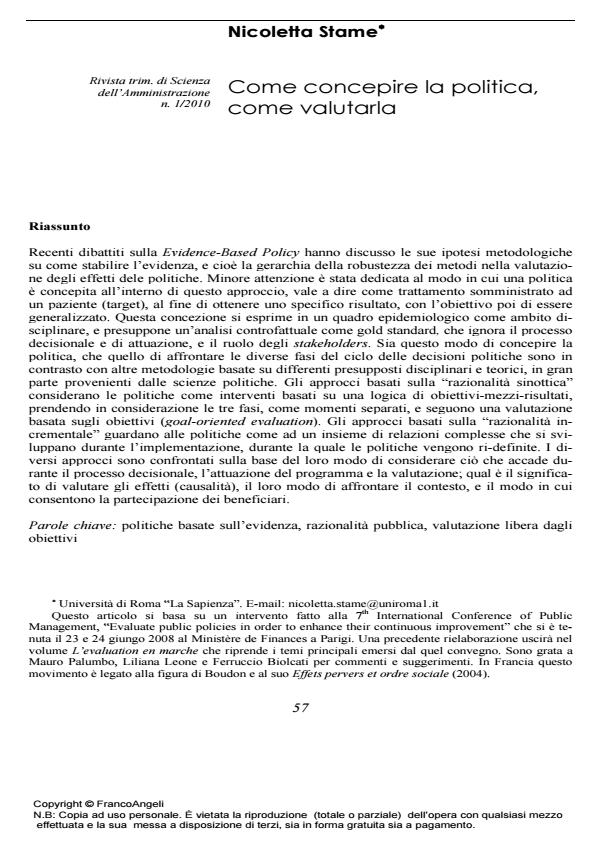Come concepire la politica, come valutarla
Journal title RIVISTA TRIMESTRALE DI SCIENZA DELL’AMMINISTRAZIONE
Author/s Nicoletta Stame
Publishing Year 2010 Issue 2010/1
Language Italian Pages 18 P. 57-74 File size 791 KB
DOI 10.3280/SA2010-001004
DOI is like a bar code for intellectual property: to have more infomation
click here
Below, you can see the article first page
If you want to buy this article in PDF format, you can do it, following the instructions to buy download credits

FrancoAngeli is member of Publishers International Linking Association, Inc (PILA), a not-for-profit association which run the CrossRef service enabling links to and from online scholarly content.
How to conceive policies, how to evaluate them Recent debates on the Evidence-based Policy movement have discussed its methodological assumptions about how to assess evidence, that is its hierarchy of methods’ robustness in evaluating the effects of policies. Less attention has been devoted to the way a policy is conceived inside that approach, namely as a treatment administered to a patient (target) in order to get a specific result, that could afterwards been generalized. This conception is couched in an epidemiological framework as it disciplinary realm, and assumes counterfactual analysis as its gold standard, which disregards decision-making and implementation processes, and the role of stakeholder. Both this way of conceiving a policy, and of dealing with the different phases of the policy cycle are at odds with other approaches based on different disciplinary and theoretical assumptions, mainly coming from the policy sciences. The approaches based on synoptic rationality consider policies as interventions based on a logic of objectives- means-results, consider the three phases as separate, and follow a goal-oriented evaluation. The approaches based on incremental rationality look at policies as a set of complex relationships that evolve during implementation, when policies are re-defined. The different approaches are compared as for the way they consider what happens during decision, implementation and evaluation; what is the meaning of evaluating effects (causality); the way they tackle the context, and how they allow for beneficiaries’ participation.
Keywords: Evidence-Based Policy, public rationality, goal-free evaluation
Nicoletta Stame, Come concepire la politica, come valutarla in "RIVISTA TRIMESTRALE DI SCIENZA DELL’AMMINISTRAZIONE" 1/2010, pp 57-74, DOI: 10.3280/SA2010-001004